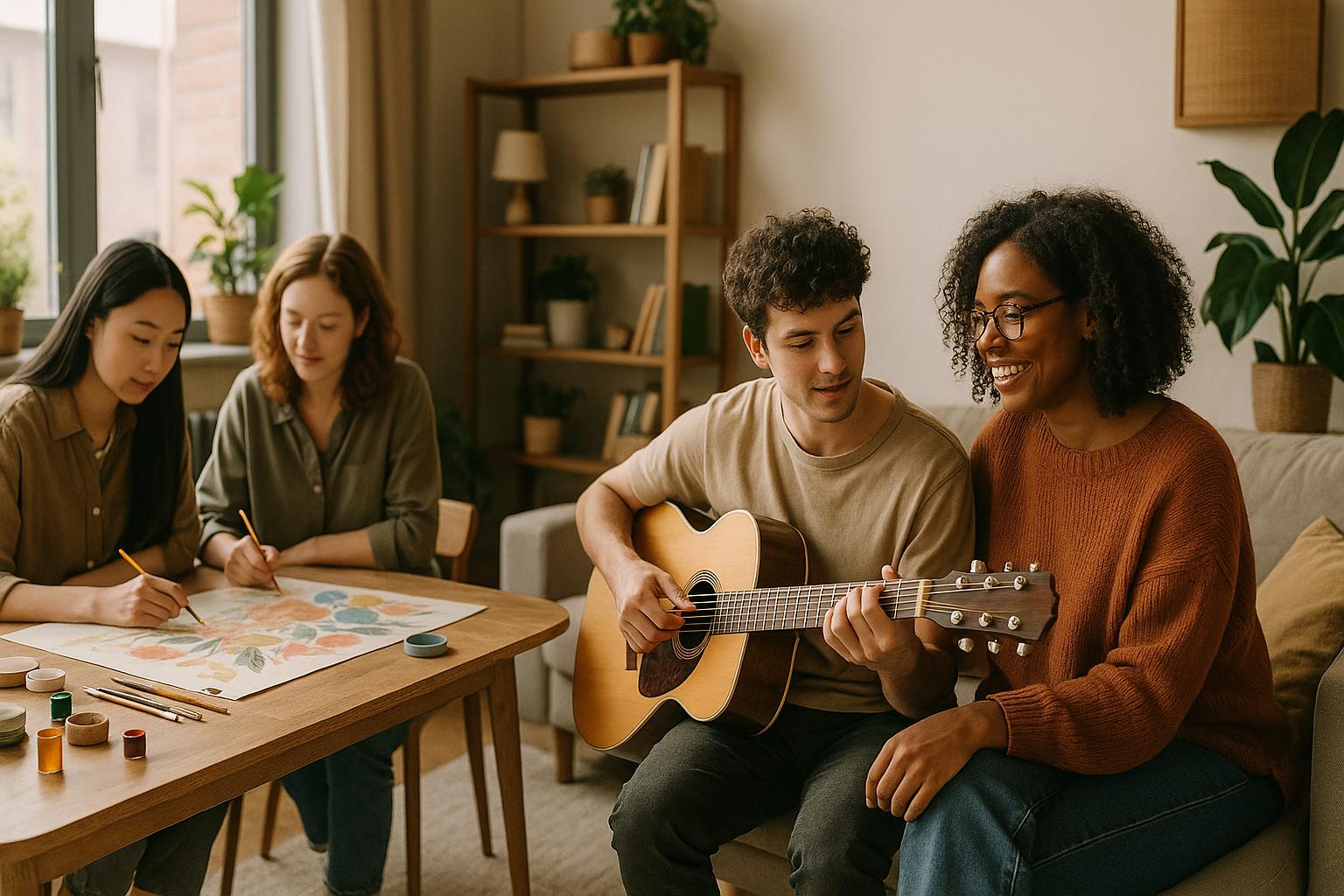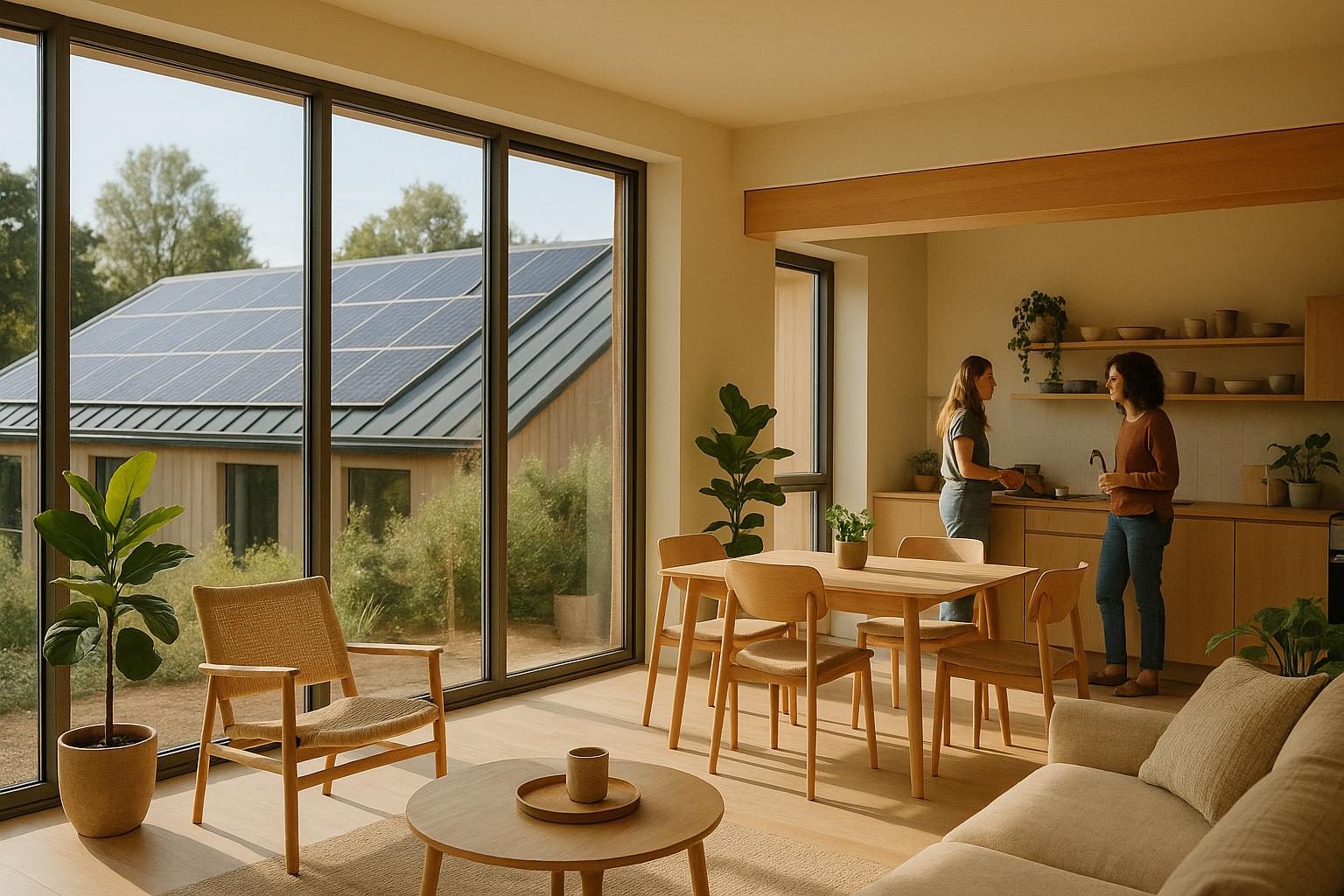Skill-sharing in coliving spaces is a game-changer for creators. It allows you to teach and learn valuable skills, collaborate on projects, and build connections - all while living in a shared community. Whether it’s learning guitar from a musician or mastering video editing from a filmmaker, coliving transforms everyday interactions into opportunities for growth.
Here’s how to make the most of skill-sharing in coliving:
- Identify your skills: Reflect on what you can teach, from professional expertise to everyday talents like budgeting or cooking.
- Learn about others: Use surveys, casual chats, or quick skill-exchange sessions to discover the talents of fellow residents.
- Set up shared spaces: Create inviting, flexible areas with the right tools and resources for workshops or collaborations.
- Use digital tools: Platforms like Google Workspace, Trello, or Notion help organize and manage skill-sharing projects.
- Communicate effectively: Apps like Slack or WhatsApp keep everyone connected and informed.
Getting Ready for Skill-Sharing in Coliving Spaces
Before jumping into workshops or collaborative projects, it’s important to set the stage for successful skill-sharing. A little preparation goes a long way in ensuring your community makes the most of these learning opportunities.
Identify Your Skills and Interests
The first step in skill-sharing is understanding what you bring to the table. Take some time to reflect on your abilities and how they could benefit your coliving community.
- Think about past roles or experiences where you’ve helped others.
- Use tools like a personal SWOT analysis to assess strengths and areas for growth.
- Ask peers for feedback - they might spot talents you’ve overlooked.
- Evaluate your communication style and how it could enhance your teaching.
Sometimes, it takes an outside perspective to uncover hidden skills. Maybe you’re the go-to person for design advice, or you’re always the one people ask about organizing events. These are valuable talents worth sharing. Even everyday skills, like meal prepping or budgeting, can make a big difference in a community setting.
Discover Fellow Residents' Talents
Take the time to learn about the skills and interests of those around you. Casual conversations often reveal surprising talents. That quiet neighbor? They might be a coding genius. The early riser? Maybe they’re a certified yoga instructor.
- Use quick surveys or host short “speed-dating” sessions to uncover skills.
- Organize five-minute skill exchanges where residents share a quick tip or trick.
- Pay attention to casual chats - someone mentioning their love for photography or pottery could spark an idea for a workshop.
Everyday interactions often highlight teaching opportunities. For instance, someone showing off their cooking skills or talking about their weekend hobby could lead to a meaningful skill-sharing session.
Set Up Shared Spaces and Resources
The right environment can make or break a skill-sharing session. Choose spaces that are inviting and practical for collaboration.
- Opt for well-lit, flexible spaces that can adapt to different activities.
- Test all equipment beforehand to avoid last-minute hiccups.
- Set clear guidelines for using shared spaces and resources.
It’s also helpful to create a system for sharing materials. A communal supply box stocked with essentials like pens, sticky notes, and extension cords can make sessions run more smoothly. For digital activities, ensure everyone has access to Wi-Fi and keep extra charging cables on hand.
| Planning Stage | Key Actions | Tips |
|---|---|---|
| Initial Setup | Survey interests and assess spaces | Pick spaces that encourage collaboration |
| Promotion | Share event details with the community | Announce early to maximize attendance |
| Resources | Gather materials and test equipment | Double-check tech readiness beforehand |
Flexible furniture is a game-changer too. Folding tables, stackable chairs, and rolling whiteboards let you quickly switch from a lecture setup to a hands-on workshop.
Once you’ve got the basics covered, you’ll be ready to dive into digital tools and communication apps, which we’ll explore in the next section.
Key Tools and Platforms for Collaboration
Setting up your coliving space with the right digital tools and reliable connectivity is essential for fostering smooth skill-sharing and collaboration. In creative communities, the right platforms can make all the difference.
Digital Collaboration Tools
The success of any skill-sharing initiative depends on tools that keep everyone connected and organized. Google Workspace is a standout option, allowing real-time collaborative editing. Watching ideas evolve as community members contribute in real time can be incredibly motivating.
For visual project management, Trello is a favorite, scoring 4.4/5 on G2 and 4.5/5 on Capterra. Its simple, user-friendly design makes it perfect for managing tasks visually.
"At EmailMeForm, we couldn't imagine functioning as a remote team without Trello. From project releases to social media planning and beyond, we use Trello to stay organized across our entire workflow." - Aiza Coronado, marketer at EmailMeForm
Another versatile platform is Notion, which combines note-taking and project management into one space. It’s especially useful for solo creators who want to document their skills while also managing collaborative projects. With Notion, your community can create a shared knowledge base to store tutorials, resources, and project updates.
For teams seeking more structure, Asana offers robust task management and workflow planning tools. If brainstorming and creative sessions are your focus, Miro is an excellent choice. With a 4.8/5 rating on G2, this interactive whiteboard tool is ideal for mind mapping, brainstorming, and even running design workshops.
| Tool | Best For | G2 Rating | Key Benefit |
|---|---|---|---|
| Google Workspace | Live document editing | N/A | Real-time collaboration |
| Trello | Visual project management | 4.4/5 | Intuitive and easy to use |
| Notion | All-in-one workspace | N/A | Combines notes and project tools |
| Asana | Workflow planning | 4.4/5 | Structured task management |
| Miro | Creative brainstorming | 4.8/5 | Interactive visual collaboration |
While these tools streamline project work, effective communication platforms ensure everyone stays on the same page.
Communication Apps
Strong communication is the backbone of any collaborative effort. Slack is a top choice, offering channel-based organization. It’s easy to set up dedicated spaces for various groups - think #photography-club, #coding-workshop, or #music-jam-sessions.
For quicker, more informal communication, WhatsApp is a go-to option. It’s particularly handy for smaller communities, with features like group chats and voice messaging that allow for instant feedback or explanations.
Discord has also grown beyond its gaming roots, becoming a favorite for voice and video communication. Its screen-sharing feature makes it perfect for coding tutorials, design reviews, or digital art workshops.
As in-person meetings are predicted to account for just 25% of team conversations by 2024, reliable digital communication tools are becoming increasingly critical.
Shared Internet and Facilities
Beyond software, the backbone of digital collaboration is a strong internet connection. High-speed, enterprise-grade Wi-Fi is a must for coliving spaces, supporting activities like video conferencing, streaming, and uploading large files without interruptions.
Etienne Détrie, Marketing Director at Wifirst, notes: "Reliable connectivity is a decisive factor in guest satisfaction - whether for short or long stays." Vincent Guilbeau, Director of Operations at Wifirst, adds: "Coliving environments must be equipped with advanced, reliable network solutions" to meet the demands of modern users.
Many coliving spaces are also integrating IoT (Internet of Things) devices and smart technologies. For instance, smart lighting can be adjusted for photography sessions, and connected speakers can enhance music collaboration projects.
A great example is The Collective Old Oak in London, which provides dedicated spaces for activities like yoga and graffiti workshops. These areas are supported by advanced digital infrastructure, enabling residents to create and share their projects seamlessly.
If your coliving space faces connectivity challenges, investing in a mesh Wi-Fi system is worth considering. This eliminates dead zones and ensures uninterrupted collaboration, whether you're working on the rooftop or in the basement studio.
Communication and Collaboration Tips
When it comes to skill-sharing in coliving spaces, clear communication and mutual respect are just as important as having the right digital tools. Open dialogue and well-defined expectations help build a cooperative and thriving community.
Set Clear Expectations
Laying out clear guidelines for time commitments, shared expenses, and communal space usage can prevent misunderstandings before they arise. The Citylifer employs a smart approach by organizing residents into "community clusters" of no more than 25 people. This smaller group size fosters meaningful connections and makes it easier to set and maintain expectations.
"The foundation of any successful coliving space is clear communication." - PadSplit
Put together written guidelines that outline responsibilities like time commitments, shared costs, and how communal areas should be used. Assign experienced residents - dubbed 'Trailblazers' - to mentor newcomers. For instance, if you’re hosting weekly photography workshops, clarify details like whether participants need to bring their own memory cards, who cleans up afterward, and how to handle damaged equipment.
Regular check-ins are essential as your community grows and evolves. A system that worked for five residents might need adjustments when the group expands to fifteen. Monthly meetings can be a great way to address changes in living arrangements, introduce new ideas, or tweak shared responsibilities.
Welcome All Skill Levels
Skill-sharing thrives when everyone feels included, regardless of their experience level. Offer a variety of teaching methods - hands-on, visual, or written - and group residents in ways that allow them to build on each other’s strengths.
Encourage residents to share their personal experiences and perspectives during learning sessions. For example, someone new to coding but experienced in graphic design can provide unique insights into user interface design that benefit the entire group.
Tailor your feedback to fit the individual. Some people respond well to direct, detailed critiques, while others might need a more encouraging and gentle approach. Pay attention to how residents react and adjust your communication style to make sure everyone feels supported.
Respect Personal Boundaries
Boundaries are crucial in any shared living situation, but they’re especially important in skill-sharing environments where creative work often involves personal expression and valuable equipment. Set clear protocols for borrowing items and using shared spaces. Always ask permission before using personal belongings, keep communal areas clean, and address issues calmly using 'I' statements.
"Boundaries are integral to any living arrangement, and coliving is no exception." - The Citylifer
"Boundaries are the gateway to healthy relationships." - Nedra Glover Tawwab, Psychotherapist
Be open to compromise. For example, maybe drum practice has to end by 9:00 PM, but you can reserve the music room for yourself every Tuesday evening. The goal is to balance everyone’s creative needs with the overall harmony of the space.
When residents feel heard and respected, they’re more likely to engage enthusiastically in skill-sharing activities. Effective communication is the foundation of successful coliving. These practices not only make collaboration smoother but also set the stage for a vibrant and supportive creative community.
Event Ideas for Skill-Sharing
Hosting regular skill-sharing events is a fantastic way for coliving residents to connect, share knowledge, and learn from one another. At Coliving.com, weekly skill-share nights are a great way to encourage collaboration and build a sense of community.
How to Host Weekly Skill-Share Nights
Here’s a quick guide to help you plan and execute successful skill-sharing events:
| Planning Stage | Key Actions | Tips |
|---|---|---|
| Initial Setup | Survey residents to find out their interests and assess available spaces. | Opt for spaces that encourage interaction and teamwork. |
| Promotion | Spread the word using group chats, shared calendars, or local noticeboards. | Announce events well in advance to maximize participation. |
| Resources | Collect any materials or tools needed and ensure all technical equipment is ready. | Test everything beforehand to avoid last-minute hiccups. |
Keeping everyone informed early through shared communication channels ensures better preparation and turnout. By following this approach, you create a strong framework for hosting other collaborative activities in your coliving space.
Building a Strong Coliving Community
Creating a thriving coliving community centered around skill-sharing takes dedication, regular feedback, and a willingness to evolve. The best communities are those where residents feel appreciated, heard, and motivated to share their unique talents.
Recognize and Celebrate Contributions
Acknowledging individual efforts is key to fostering a sense of belonging and encouraging participation. When residents see their contributions being valued, it sparks a positive ripple effect, motivating others to get involved.
Public recognition is especially effective in coliving spaces. Highlighting contributors during community meetings or sharing their achievements on platforms like Slack or bulletin boards can make a big impact. This visibility not only shows appreciation but also inspires others to step up and share their skills.
Simple gestures like thank-you notes, verbal shoutouts, or certificates can go a long way in showing gratitude. Some communities even offer small rewards, such as gift cards to local cafes or bookstores, to celebrate active participants.
Don’t stop at recognizing skill-sharing efforts - celebrate personal milestones too. Whether it’s landing a new job, completing a creative project, or mastering a new skill, these moments strengthen personal connections within the community.
Establishing traditions also helps build a sense of identity. Annual events like anniversary parties, end-of-year showcases, or seasonal festivals create lasting memories and give residents something to look forward to. These celebrations become a cornerstone of the community experience.
Ask for Feedback to Improve
Regularly seeking feedback ensures your skill-sharing initiatives stay relevant and engaging. What worked a few months ago might no longer resonate, so staying attuned to residents’ needs is essential.
Offer multiple ways for residents to share their thoughts. Anonymous suggestion boxes in common areas can encourage honest feedback, while community meetings create space for open discussions. Digital surveys sent out quarterly or monthly can provide deeper insights into specific events or programs.
Feedback doesn’t always have to be formal. Casual conversations in shared spaces or quick check-ins during meetings can uncover valuable ideas. Questions like, “What skills would you like to learn next?” or “How can we improve the workshop space?” can lead to actionable suggestions.
The key is to act on the feedback you receive. When residents see their ideas being implemented - like adding better lighting to a workspace or organizing a cooking class - they’ll feel heard and be more likely to share their thoughts in the future.
Occasionally, take a step back and assess how skill-sharing impacts overall community satisfaction. These deeper evaluations can reveal opportunities or challenges that might not surface during day-to-day interactions.
Make Skill-Sharing Part of Daily Life
Once you’ve recognized contributions and gathered feedback, the next step is to weave skill-sharing into the fabric of everyday life. The more natural it feels, the more effective it becomes.
Start by making skill-sharing visible. Dedicate a wall or board in a high-traffic area where residents can post what they’re working on, what they can teach, or what they want to learn. A simple “Skills Board” can spark conversations and lead to organic collaborations.
Incorporate skill-sharing into existing routines. During regular coffee hours or dinner gatherings, encourage residents to talk about their projects or ask for help. These informal moments often lead to meaningful exchanges.
Pairing residents with complementary skills - like matching a photographer with a writer - can create casual mentorship opportunities. These partnerships often evolve into lasting friendships and collaborations.
You can also rotate responsibilities to give different residents a chance to share their expertise. For example, one person might lead a budgeting workshop one month, while another organizes a neighborhood art walk. This keeps skill-sharing fresh and ensures it remains a regular part of community life.
The ultimate goal is to make skill-sharing feel second nature. When residents naturally turn to one another for help or to learn something new, your community becomes a true hub of collective knowledge and creativity, where everyone benefits from each other’s strengths.
Conclusion
Skill-sharing transforms coliving spaces into dynamic communities where artists, writers, designers, and other creators can truly flourish. By exchanging talents and learning from one another, residents create an atmosphere that goes far beyond just sharing a roof - it becomes a place of inspiration and collaboration.
Take Os Mixtos in Spain, for example. Research reveals that 74% of its residents feel less lonely - a striking contrast when you consider that 1 in 3 adults in the U.S. struggles with serious loneliness. Through collaboration and teaching, creators not only improve their skills but also forge meaningful connections that combat isolation.
The key to success lies in fostering regular events that encourage mutual respect, maintaining open communication to avoid misunderstandings, and embracing cultural exchanges that enrich the group. Whether it’s organizing weekly skill-sharing sessions, creating collaborative workspaces, or simply exchanging knowledge during everyday interactions, the impact is undeniable. These shared experiences help creators grow by exposing them to fresh perspectives and ideas.
In the most vibrant coliving communities, skill-sharing becomes second nature. Residents naturally turn to each other for creative input, technical advice, and opportunities to collaborate on projects. This creates a space where collective creativity thrives, and everyone benefits from the shared pool of expertise.
For creators, coliving spaces with a strong culture of skill-sharing offer unparalleled chances to network, hone their craft, and build lasting partnerships. It’s a way of living and working that elevates both the individual and the community.
FAQs
How can I recognize and share my skills effectively in a coliving space?
Start by identifying what makes you stand out - whether it’s a knack for painting, a flair for coding, or a passion for cooking. Think about the hobbies, talents, or professional skills you have that others might find interesting or helpful. Once you’ve pinpointed these strengths, take some time to connect with your coliving community and get a sense of what they’re into or what they might need.
When you’re ready to share, try organizing casual workshops, group projects, or even skill-swap sessions. These are great ways to not only highlight your talents but also encourage learning from one another and building deeper connections. Creating an open and supportive atmosphere will help nurture collaboration and growth, making your coliving space a more vibrant and engaging place to live.
How can I connect with and learn from the skills and talents of other residents in a coliving space?
Connecting with others in a coliving space often begins with creating chances to interact and bond. One way to do this is by organizing skill-sharing sessions or workshops where residents can showcase their abilities. Think cooking classes, art lessons, or even language exchanges. These activities not only allow people to learn from one another but also help build a stronger sense of community.
Hosting group events is another effective way to bring everyone together. Cultural dinners, game nights, or brainstorming meetups can spark collaboration and even reveal hidden talents among housemates. If you prefer a more organized approach, consider setting up mentorship groups or project teams that align with shared interests. Taking on community responsibilities, like planning events or managing social media for the house, is also a great way to connect and engage with your fellow residents.
Creating an environment that encourages collaboration and openness helps everyone feel more at ease to connect, share ideas, and grow together in the coliving space.
What are the best digital tools for organizing and improving skill-sharing activities in coliving spaces?
To keep skill-sharing in coliving spaces both seamless and interactive, try leveraging tools like Slack or Zoom for virtual meetups and group chats. For collaborative projects and resource sharing, Google Workspace works wonderfully. Platforms such as Disco can streamline community interactions, making it easier to manage and grow connections. When it comes to organizing events and activities, tools like Circle and Nexudus can provide all the support you need to create a lively, connected environment.






